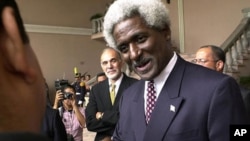The Obama administration says it is not backing away from its choice for U.S. ambassador to Venezuela, Larry Palmer, despite his rejection by the Caracas government. The State Department Wednesday brushed aside a list of alternate proposals by Venezuelan President Hugo Chavez.
The State Department is bluntly dismissing ambassadorial suggestions by Mr. Chavez, and it is making clear it is ready to have the U.S. envoy post vacant for an indefinite period, rather than abandon its initial choice.
The government of Venezuelan President Hugo Chavez last month formally withdrew its acceptance of veteran diplomat Larry Palmer as U.S. ambassador, citing critical comments Palmer made about the Caracas government several months ago at a Senate confirmation hearing.
In a televised speech Tuesday, a jocular Mr. Chavez said he would accept alternate candidates, listing former president Bill Clinton, film actor Sean Penn, movie director Oliver Stone and leftist philosopher Noam Chomsky.
All but Mr. Clinton have been vocal supporters of the populist Venezuelan leader, with director Stone making a flattering documentary film about Mr. Chavez and other leftist Latin American leaders last year.
At a news briefing, State Department Spokesman P.J. Crowley said U.S. officials appreciate the Chavez suggestions, but said the fact is the administration is not looking for another candidate.
Crowley said Palmer, a former U.S. ambassador to Honduras, is fully qualified and would have been an "effective interlocutor" to improve the strained U.S.-Venezuela relationship.
He also said the United States is not prepared to blunt its criticism of what U.S. officials see as an authoritarian bent by the Chavez government.
"We have not shied away from offering our view and our concerns about what is happening in Venezuela," said P.J. Crowley. "We believe that an ambassador on the ground in Caracas would both have the ability to engage the government of Venezuela but also make clear in our interaction with Venezuelan civil society that we support freedom of the press, we support private enterprise. We decry the increasingly autocratic trends in Venezuela."
The nomination of Palmer in the U.S. Senate technically expired with the end of the last Congress in December. But Crowley said the administration has "not stepped back" from its support of Palmer and is not actively looking for another nominee.
He said the administration is prepared to, in his words, "stay where we are," with no full ambassador in Caracas, for an indefinite period.
The United States and Venezuela have had tense relations since early in the previous Bush administration, and the Obama administration was recently highly critical of a move by Mr. Chavez to rule by decree.
US Sticking With Choice for Envoy Despite Venezuelan Rejection




